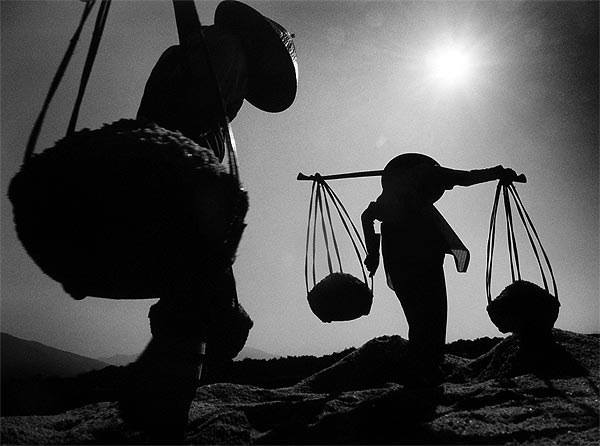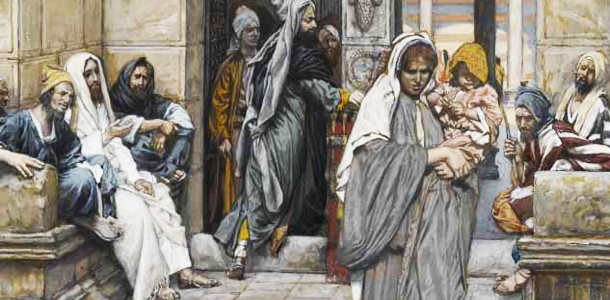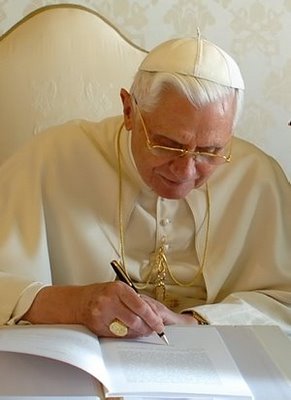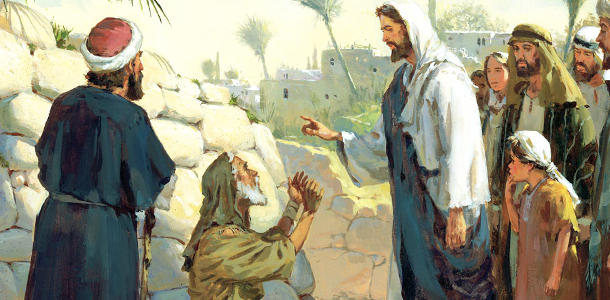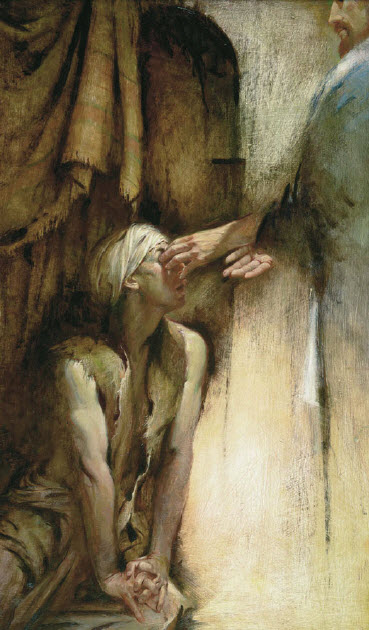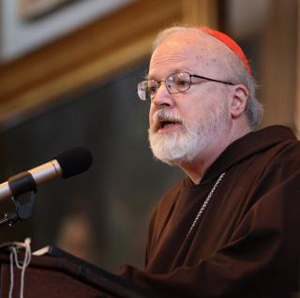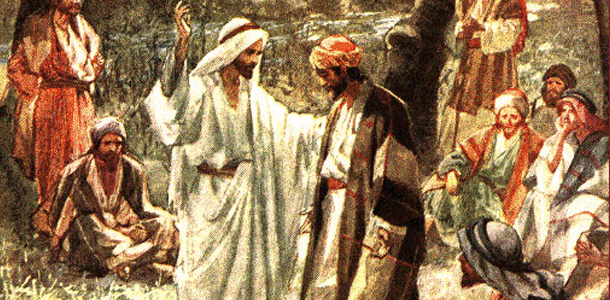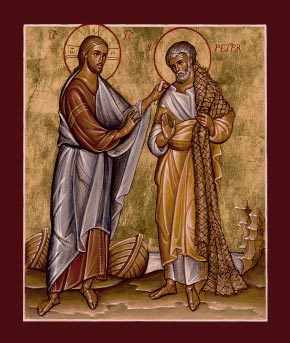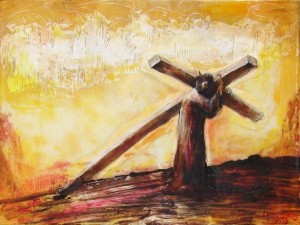 The readings for the 4th Sunday of Advent are Micah 5:1-4a; Hebrews 10:5-10; and Luke 1:39-45A Biblical Reflection for the Fourth Sunday of Advent, Year C The Infancy Narrative of Luke’s Gospel contains some of the most touching, well-known biblical scenes in the New Testament. Not only does the annunciation of the Baptist’s beginnings precede that of Jesus (1:5-24), but the birth of John the Baptist precedes Jesus’ birth (1:26-38). The announcement to Mary of the birth of Jesus (Luke 1:39-45) is parallel to the announcement to Zechariah of the birth of John. In both stories the angel Gabriel appears to the parent who is troubled by the vision (Luke 1:11-12, 26-29), and then told by the angel not to fear (Luke 1:13, 30). After the announcement is made (Luke 1:14-17, 31-33) the parent objects (Luke 1:18, 34) and a sign is given to confirm the announcement (Luke 1:20, 36). The particular focus of the announcement of the birth of Jesus is on his identity as Son of David (Luke 1:32-33) and Son of God (Luke 1:32, 35). In the very personal scene of Mary’s visitation to Elizabeth (1:39-45), the Precursor and the Lord are both hidden from each other. Yet even before the two women embrace, John leaped for joy in his mother’s womb, having recognized the presence of the Lord and Messiah in the womb of Mary. Both births are hailed by two beautiful canticles: the Benedictus sung by Zechariah, father of the Baptist, at his son’s birth (1:68-79), and the “Nunc Dimittis” prayed by Simeon, the “righteous and devout” man in the Jerusalem temple, as he takes the infant Jesus in his arms (2:22-35). The two pregnant women of today’s Advent gospel, Mary and Elizabeth, recognized in each other signs from God. The angel Gabriel offered Mary a lesser parallel to her own virginal conception: “Know that Elizabeth your kinswoman has conceived a son in her old age; she who was thought to be barren is now in her sixth month, for nothing is impossible with God” (Luke 1:36). Elizabeth in her turn senses in the movement of the child in her womb on Mary’s arrival that something extraordinary was happening. “Who am I that the mother of my Lord should come to me?” Each of the women experienced in herself the possibility of the impossible. Trust in God The visitation of Mary to Elizabeth turned out to be a divine visitation, the Ark of God bringing not terror but blessing as it did to the house of Obededom the Gittite (1 Samuel 6:9-11). Unlike Sarah, who had laughed at the notion that she could conceive and bear a child in her old age to Abraham (Genesis 18:12), and unlike Zechariah, her husband, who had been struck dumb for questioning God’s power in this matter (Luke 1:8-20), Elizabeth gives thanks to God and trusted in his providence: “So has the Lord done for me at that time when he has seen fit to take away my disgrace before others” (Luke 1:25). Mary, for her part, deserved to be acclaimed by Elizabeth as “she who trusted that the Lord’s words to her would be fulfilled.” Although Mary is praised for being the mother of the Lord and because of her belief, she reacts as the servant in a psalm of praise, the Magnificat. The Magnificat celebrates the wonders of God’s graciousness in the lives not only of these two Advent women but of all for whom “the Mighty One has done great things” (Luke 1:49). There are two aspects of today’s Visitation scene to consider. The first is that any element of personal agenda of Mary and Elizabeth is put aside. Both had good reason to be very preoccupied with their pregnancies and all that new life brings. Both women had a right to focus on themselves for a while as they made new and radical adjustments to their daily lives. 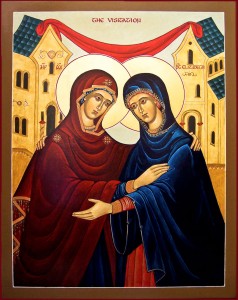 Mary reaches out to her kinswoman to help her and also to be helped by her. These two great biblical women consoled each another, shared their stories, and gave each other the gift of themselves in the midst of the new life that they must have experienced: Elizabeth after her long years of barrenness and now sudden pregnancy, and Mary, after her meeting with the heavenly messenger, and her “irregular” marriage situation and pregnancy. Mary reaches out to her kinswoman to help her and also to be helped by her. These two great biblical women consoled each another, shared their stories, and gave each other the gift of themselves in the midst of the new life that they must have experienced: Elizabeth after her long years of barrenness and now sudden pregnancy, and Mary, after her meeting with the heavenly messenger, and her “irregular” marriage situation and pregnancy.The second point to consider is Mary’s quick response and movement. Luke tells us that she undertook “in haste” the long and perilous trek from Nazareth to a village in the hill country of Judea. She knew clearly what she wanted and did not allow anyone or anything to stop her. In his commentary on Luke’s Gospel, St. Ambrose of Milan describes this haste with a difficult Latin phrase, “nescit tarda molimina Spiritus Sancti gratia,” which could mean: “the grace of the Holy Spirit does not know delayed efforts,” or “delayed efforts are foreign to the grace of the Holy Spirit.” Mary’s free choice to move forward and outward reflects a decision taken deep within her heart followed by immediate action. Procrastination How many things exist in our lives that we dreamed of doing, should have done, and never did — letters that should have been written, dreams that should have been realized, gratitude that was not expressed, affection never shown, words that should have been spoken, etc.? Postponements and delays weigh heavily upon us, wear us down and discourage us. They gnaw away at us. How true St. Ambrose described Mary’s haste: The Spirit completely possessed the Virgin Daughter of Nazareth and compelled her to act. The story of the Visitation teaches us an important lesson: When Christ is growing inside of us, we will be led to people, places and situations that we never dreamed of. We will bear words of consolation and hope that are not our own. In the very act of consoling others, we will be consoled. We will be at peace, recollected, because we know that however insignificant our life and issues seem to be, from them Christ is forming himself. The women of today’s Gospel show us that it is possible to move beyond our own little, personal agendas and engage in authentic ministry and service in the Church. Ministry and service are not simply doing things for others. Authentic Christian ministers and servants allow themselves to serve and be served, taught, cared for, consoled and loved. Such moments liberate us and enable us to sing Magnificat along the journey, and celebrate the great things that God does for us and His people. Consider these words of Blessed Mother Teresa of Calcutta (1910-1997): “In the mystery of the Annunciation and the Visitation, Mary is the very model of the life we should lead. First of all, she welcomed Jesus in her existence; then, she shared what she had received. Every time we receive Holy Communion, Jesus the Word becomes flesh in our life — gift of God who is at one and the same time beautiful, kind, unique. “Thus, the first Eucharist was such: Mary’s offering of her Son in her, in whom he had set up the first altar. Mary, the only one who could affirm with absolute confidence, ‘this is my body,’ from that first moment offered her own body, her strength, all her being, to form the Body of Christ.” God’s choice Let me conclude with these thoughts given to me years ago by an elderly Italian religious sister who made a retreat I preached in a small Umbrian town in Italy just prior to Christmas. The poem is entitled “Bellezza” meaning “Beauty,” and speaks about God’s choice of Mary for a special mission. Don’t smile, brothers and sisters, And don’t shrug your shoulders: Our God is fascinating and what he does always surpasses the impossible. God looked upon a woman and loved her, And he who loves even before looking at the face Seeks the beauty that lies in the heart. God looked upon a woman who was from the race Of the little ones without name, Those that live far away from palaces. Those who work in kitchens, Those who come from the numbers of the humble and the forgotten, Those that never open their mouths and who are accustomed to poverty. God looked upon her and found her to be beautiful, And this woman was joined to him as if she were his beloved – For life and for death. From now on all generations will call her blessed. God looked upon a woman. Her name was Mary. As a woman who gives herself, she believed, And during the night, in a grotto, she cried out with pain, And from her womb God himself was born, Brining with him salvation and peace, like treasures for all eternity. As a woman who surrenders herself and never regrets it, She believed against all the obscurity that enveloped her, Against all the doubts that filled her. From now on her name will be sung, because God took her And she gave herself to him, she, Mary, one of us. And God crowned her with stars and robed her with the sun, And under her feet God placed the moon. Her name is Mary, and if you looked upon her Lord, it is because on Our earth filled with women and men, you found such beauty. |
__._,_.___
